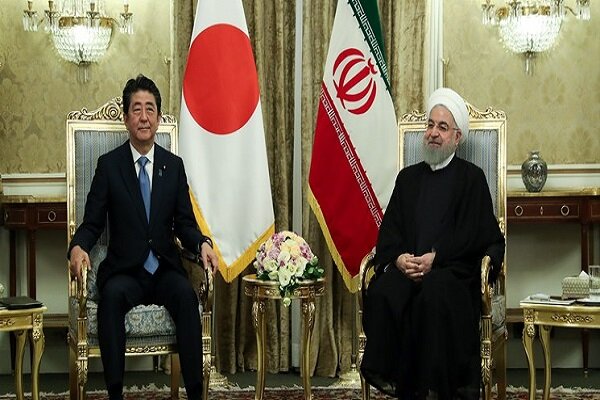TEHRAN – Japanese Prime Minister Shinzo Abe visited Tehran on Wednesday afternoon for talks with top Iranian leaders.
Abe was welcomed by Foreign Minister Mohammad Javad Zarif at Mehrabad Airport.
President Hassan Rouhani officially welcomed Prime Minister Abe at Sa'dabad Palace. After the welcome ceremony, which included a guard of honor and the playing of national anthems of the two countries, Rouhani and Abe started private talks.
It was planned that after the Rouhani-Abe talks, delegations from the two countries start a joint meeting.
The Japanese prime minister is scheduled to meet with Leader of the Islamic Revolution Ayatollah Ali Khamenei on Thursday morning.
The visit has been called historic.
Though no official statements have been made that during his talks with the Iranian leaders the Japanese prime minister will seek to act as a mediator to deescalate tension between Iran and the United States, it was highly expected that Abe use his country’s good ties with Tehran and Washington to ease the tension between Iran and the United States.
Japan was one of the eight countries that imported oil from Iran before the Trump administration ended sanctions waivers for Iran’s oil exports in April.
Amid escalating tensions between Tehran and Washington, the U.S. has sent military reinforcements, including the USS Abraham Lincoln aircraft carrier strike group, a squadron of B-52 bombers, and a battery of patriot missiles, to the Middle East, citing alleged unspecified “threats” from Iran.
Before his departure to Tehran, Abe said he wanted to have candid talks with the Iranian leadership to secure stability in the Middle East, in a high-stakes attempt to act as a mediator between Iran and the United States.
“There are concerns over rising tensions in the Middle East. While the situation attracts the attention of the international community, for peace and stability in the region, Japan wants to play a role as much as it can,” Kyodo News quoted him as telling reporters at Tokyo’s Haneda airport.
“To ease tensions, I’d like to have a frank exchange of views,” said Abe.
Talking to Zarif before Abe’s arrival to Tehran, Japanese Foreign Minister Taro Kono said, “We believe that in this important region a lesser tension will benefit all, otherwise we all lose.”
He added, “Japan is ready to do whatever that leads to reducing tension.”
“Rational approach”
Parliament speaker Ali Larijani said the visit to Tehran by the Japanese prime minister shows that Iran has a “rational approach” by trying to settle issues through dialogue.
“The presence of the prime minister of Japan in Iran is the product of Iran’s rational approach that follows issues through dialogue,” noted Larijani, a philosopher-turned politician who acted as Iran’s chief nuclear negotiator with the European Union when Javier Solana was the 28-nation bloc’s chief diplomat.
The senior MP said Iran holds talks on international and regional issues with “friends” and countries who show interest in dialogue. “Japan is one of those countries that over the past years has always had interaction and economic relations with the Islamic Republic of Iran.”
The parliament speaker also referred to German Foreign Minister Heiko Maas’s talks with Zarif and Rouhani on Monday and said Rouhani will attend the Shanghai Cooperation Organization summit in Bishkek on Thursday and Friday where he will hold talks with foreign officials including the presidents of Russia and China.
With an indirect reference to the Trump administration’s intensified sanctions pressure on Iran, Larijani said the visit by Abe shows that if “different parties” show seriousness and “act properly the issues would be resolved more easily”.
Foreign Minister Zarif praised the old relationship between Iran and Japan which enjoy 90 years of diplomatic relationship.
Talking to his Japanese counterpart, Zarif said Iran considers Japan as a “good friend and partner” which have political, economic and cultural ties with.


No comments:
Post a Comment